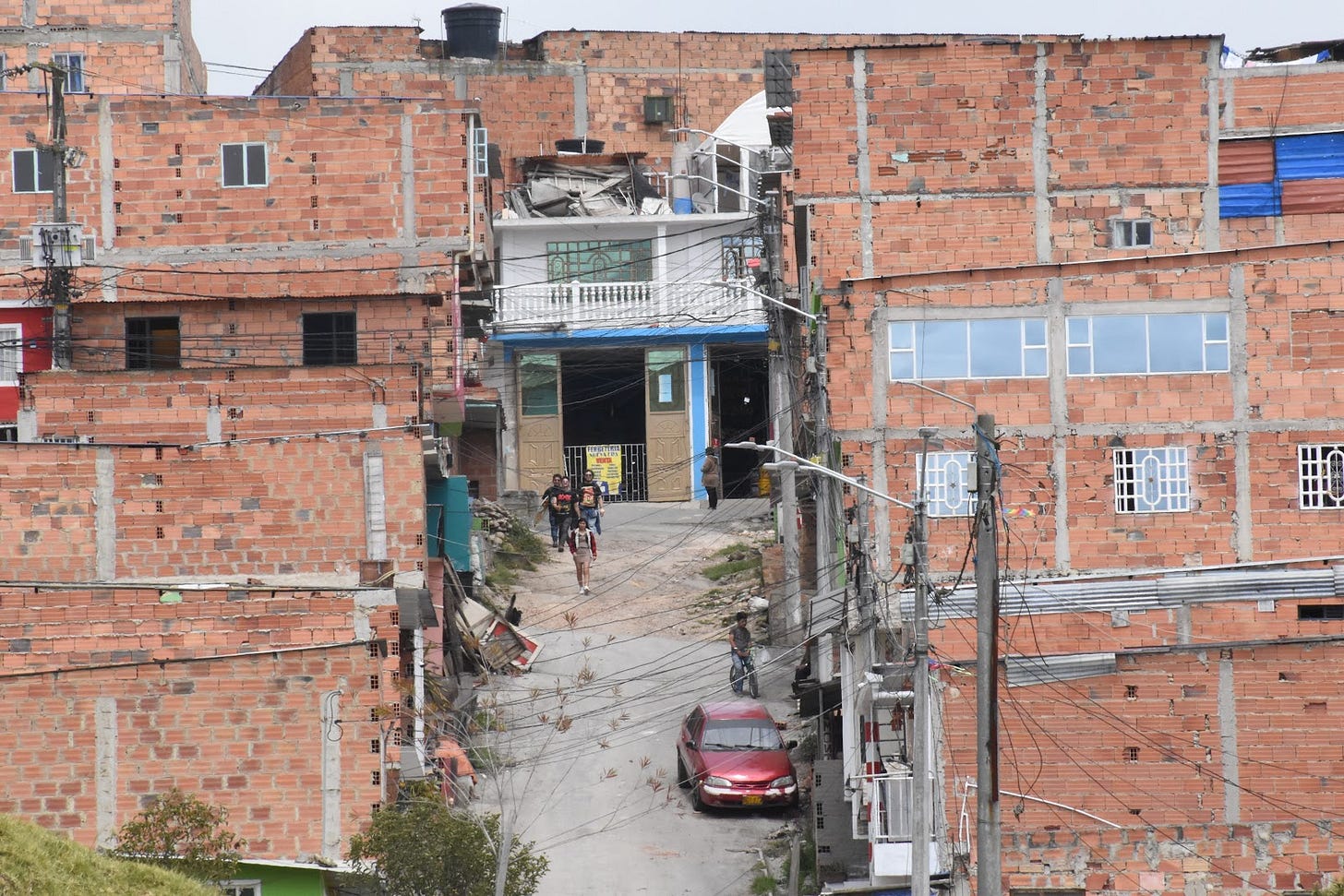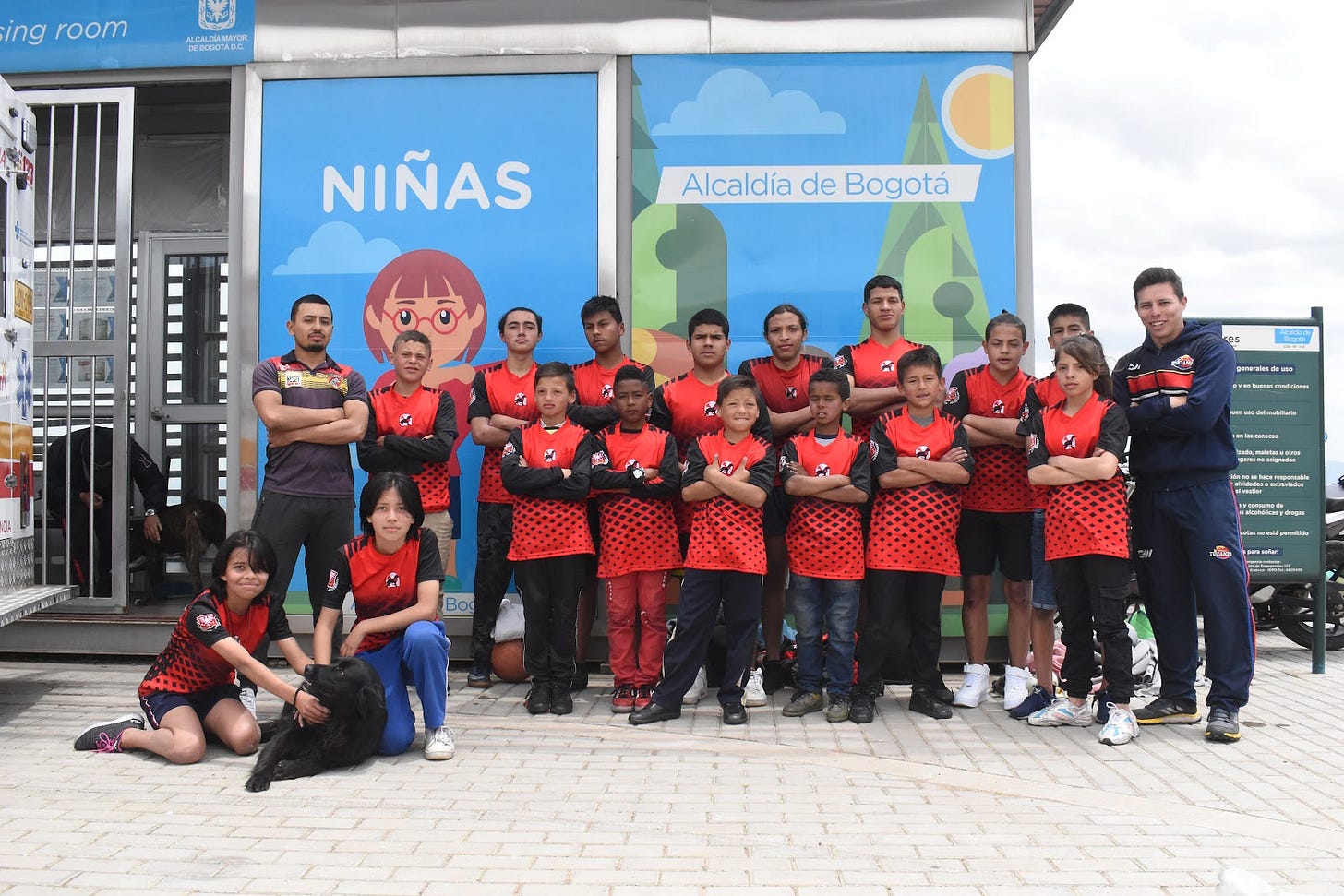Colombia’s Dangerous Field of Dreams
In a country where soccer is king, a rugby coach is introducing kids to a new sport in hopes it will give them the life skills to survive the mean streets of Bogota’s toughest neighborhoods
Thirty minutes before practice begins, as children and young teens gather near an old soccer field repurposed for rugby, a dozen gunshots ring out, breaking the silence of the early morning.
The shootout is only two blocks away, and most likely gang-related, but the young rugby players seem unfazed. The sound of gunfire is background noise in Ciudad Bolívar, one of the most dangerous neighborhoods in Colombia’s capital. A few months earlier, the entire team had to scatter mid-practice when a nearby turf battle between gangs spilled over onto the field where they were training.
Despite the dangers, the kids keep showing up to practice.
“Most of these kids come from broken homes,” rugby coach Nico Suárez tells PWS. “A lot of them have problems with aggression, poor social skills and trust-issues. Watching them take the first steps to move beyond that is a powerful experience.”
Suárez is building a regional rugby association in some of the city’s poorest and most dangerous neighborhoods. He hopes that forming a positive community that stresses life lessons in team-building can offer new opportunities for underprivileged youths growing up in poverty, and hopefully shows them there can be more to life than the conditions into which they were born.
After all, it worked for him.
“I was a troubled youth,” coach Suárez explains. “The community support I found through rugby, and the lessons I learned from dedicating myself to the sport helped me turn my life around.”
Now he wants to pass that experience on to those who need it most. But in a nation where soccer is the national obsession, raising funds for a rugby league hasn’t been easy.
Game on!
As Suárez leads the players through a series of warmup stretches, a dozen curious dogs from the neighborhood take to the field as well. They are a constant presence at training sessions, so much so that the team has adopted one of them — Violeta, a particularly gentle black lab — as the team mascot and logo.
After stretches, Suárez leads the group in tackling exercises. The team is coed. Two young girls, Mafe and Danna, are standouts on the field. The young teens swear like sailors and don’t seem to have any fear of going head-to-head against male linesmen twice their size.
“When they started training with us, they were very distant, very distrustful,” says Suárez of his two female stars, with clear pride. “They come from situations of abuse and a fatherless home.”
“Most of these kids come from broken homes. Watching them take the first steps to move beyond that is a powerful experience.” —coach Nico Suárez
During a session on passing exercises and scrimmages, players dodge tackles and street dogs that give chase.
Danna gets tackled hard and, after fumbling the ball, screams a swear related to female genitalia. Her teammates laugh and help her up, complimenting her on her tenacity.
“We still need to work on the language thing,” Suárez says sheepishly.
Tough neighborhoods
Ciudad Bolívar and neighboring Barrio Kennedy occupy Bogota’s “misery belt.” Most of these communities lack access to quality education, basic security and — in some areas — potable water.
The barrios and shanty towns that comprise these neighborhoods account for more than half of the reported homicides in the capital city. Robberies, drug-trafficking and prostitution are rampant, even though most crimes are thought to go unreported, due to a lack of trust in the police or fear of retaliation from gangs.
“Violence has been completely normalized,” Suárez says. “There are some neighborhoods we simply can’t enter.”
Suárez says the kids on his team live in constant danger of stray bullets.
“The interior walls of the houses are thicker than the exterior walls, so when the kids are sleeping in a bedroom with an exterior wall and hear gunfire, they get up and join family members who sleep in the interior bedrooms,” Suárez says. “We have to constantly keep in mind the environment these kids come from. Many of them have experienced incredible trauma in their lives.”
That’s why Suárez’s organization, Rugby Social Bogota, has a full-time psychologist with training as a social worker on its three-person staff.
Funding challenges
Rugby Social Bogota began four years ago in another underprivileged neighborhood in the north of the city called Suba. It has been operating in Ciudad Bolívar for just over a year.
The organization is funded by private donations, mostly members of the international rugby community whom Suárez knows personally.
“Launching the project was difficult,” he says, “especially in a country that doesn’t understand rugby.”
But they are now fielding players in regional competitions, and Suárez hopes that, as the organization grows, he can secure more donors.
Funding basic sporting gear is a constant problem, he said. A set of rugby cleats can represent a month's salary to some of the players' families. But the community has been “extremely supportive,” he says — a model he hopes the children will learn from and emulate.
Making a difference
As practice ends, the team huddles for a speech before breaking from the field. Suárez talks about how important communication is both on and off the field. With a group shout, the huddle disperses, and both players and street dogs wander off.
Mafe approaches Suárez and gives him a hug. “Thanks, coach,” she says. “See ya soon.”
“Did you see that hug?” Suarez asks with a smile. “A year ago, that would have been unthinkable. That’s all the proof I need to know we are making a difference.”
The Big Headlines in Latam
A riot at a women’s prison in Honduras on Tuesday killed at least 46 women. The majority of deaths were due to a fire set as two rival gangs fought for control of the complex.
President Xiomara Castro, was “shocked” by the inevitable result of her copycat policies to jail thousands in a crackdown that deprives citizens of their basic rights, and promised an investigation into what possibly could have caused this.
Guatemala goes to elections Sunday in a campaign that has been sharply criticized by the international community. A large number of candidates were prevented from participating by the ruling parties in what many rights groups have called “an erosion of democracy”.
The county, which has long been plagued by high crime rates, will be deciding which pre-approved candidates will get to design new policies that are effectively copycat designs of unconstitutional crackdowns in El Salvador and Honduras.
Our own Amy Booth has been covering the election cycle in Argentina, where the Kirchnerist candidate for president surprised many analysts and raised a lot of eyebrows. You can read more on that here in the Buenos Aires Herald.
What We’re Writing
In case you missed it PWS released a new podcast this week examining the role of adventure tourism in the Darien Gap, which has been causing scandals lately in South America.
As part of that, we reached out to photojournalist Jordan Stern, who has reported from inside the most dangerous migration corridor in the Americas, and it was a fascinating conversation. Check it out!
For paid subscribers, Wednesday we published a piece on press freedom in Colombia. The right, after years of brutal crackdowns and prosecution of journalists they don’t like, has a sudden and newfound interest in press freedom— but are they serious?
We broke it all down in this article by Joshua.
Spanish Word of the Week
quijotesco/a
Every so often, a word or phrase will come about because of a famous work or movie, such as “Catch 22” or “a Romeo”.
The adjective quijotesco/a comes from Don Quijote which is the famous book by Cervantes. The term quijotesco/a refers to anything illusionary, bizarre, unreal, or dream-like, because Don Quixote (who is arguably mentally ill and delusional) misinterprets mundane things for fantastical ones; most famously mistaking windmills for giants. The English form of this word is “quixotic” which shares the etymology of quijotesco/a.
We’ll be back next week for more cobertura quijotesca!
Until then, cuidense piratas!







